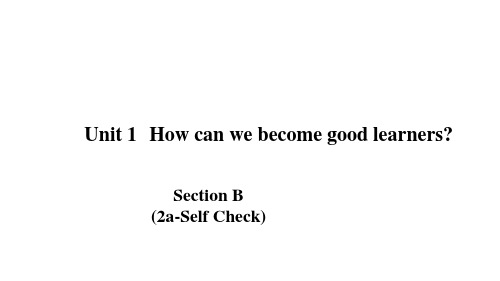九年级全一册Unit1全单元课件ppt
合集下载
人教九年级全册Unit1Section B 1a—1e(共17张PPT)

people talk to him. 4. He doesn’t get much w__ri_ti_n_g___ practice.
1d Listen again. Complete the solutions.
Solutions 1. _L_i_s_te_n_i_n_g____ can help. 2. He can always _w_r_it_e__th_e__n_ew__w__o_r_d_s _ in his notebook and study them at home. 3. He can _j_o_in__a_n_E_n_g_l_i_sh__la_n_g_u_a_g_e__cl_u_b_ to practice speaking. 4. He should find a __p_e_n__p_a_l __ to practice
人民教育出版社初中英语九年级全一册第一单元第三课时
Unit 1 How can we become good learners? Section B (1a-1e)
学习目标
1.熟练掌握以下词汇和短语:pronounce, partner, increase, speed, make mistakes in grammar,understand spoken English等。 2.能够学会并运用重点句型表达问题和建议, 如: “I don’t know how to increase my reading speed.”,
What should I do? B:Well, listening can help. Why don't you listen to the tape and repeat after it. A:That's a good idea. Thanks.
1d Listen again. Complete the solutions.
Solutions 1. _L_i_s_te_n_i_n_g____ can help. 2. He can always _w_r_it_e__th_e__n_ew__w__o_r_d_s _ in his notebook and study them at home. 3. He can _j_o_in__a_n_E_n_g_l_i_sh__la_n_g_u_a_g_e__cl_u_b_ to practice speaking. 4. He should find a __p_e_n__p_a_l __ to practice
人民教育出版社初中英语九年级全一册第一单元第三课时
Unit 1 How can we become good learners? Section B (1a-1e)
学习目标
1.熟练掌握以下词汇和短语:pronounce, partner, increase, speed, make mistakes in grammar,understand spoken English等。 2.能够学会并运用重点句型表达问题和建议, 如: “I don’t know how to increase my reading speed.”,
What should I do? B:Well, listening can help. Why don't you listen to the tape and repeat after it. A:That's a good idea. Thanks.
人教版九年级全册Unit1课件 (共25张PPT)

Are these habits good or bad? Why?
listening to music when learning
sleeping in class
talking with other students in class
They are not good habits for learning English.
1. What does “Practice makes perfect.” mean? Keep practicing. 2. If successful learners make mistakes, what do they often do? They learn from mistakes.
Read, study and learn about everything imporant in your life
Read Paragraph 3 and answer the questions.
Practicing and learning from mistakes Good learners think about what they are good at and what they need to practice more. Remember, “Use it or lose it.” Even if you learn something well, you will forget it unless you use it. “Practice makes perfect.” Good learners will keep practicing what they have learned, and they are not afraid of making mistakes. Alexander Graham Bell did not invent the telephone overnight. He succeeded by trying many times and learning from his mistakes.
listening to music when learning
sleeping in class
talking with other students in class
They are not good habits for learning English.
1. What does “Practice makes perfect.” mean? Keep practicing. 2. If successful learners make mistakes, what do they often do? They learn from mistakes.
Read, study and learn about everything imporant in your life
Read Paragraph 3 and answer the questions.
Practicing and learning from mistakes Good learners think about what they are good at and what they need to practice more. Remember, “Use it or lose it.” Even if you learn something well, you will forget it unless you use it. “Practice makes perfect.” Good learners will keep practicing what they have learned, and they are not afraid of making mistakes. Alexander Graham Bell did not invent the telephone overnight. He succeeded by trying many times and learning from his mistakes.
Unit 1 课件人教版九年级全册

Paul: That might really help! Thanks.
Ms. Manson: Can you understand when people talk to you?
Tapescript
Unit 1 Section B (1a-1e)
Paul: Well, not always. Sometimes I just don’t understand what
Tapescript
Unit 1 Section B (1a-1e)
Ms. Manson: You look worried, Paul. Paul: I am, Ms. Manson. I’m having trouble learning English. Ms. Manson: You said you liked English. What’s the problem? Paul: I can’t get the pronunciation right. Ms. Manson: Well, listening can help. Why don’t you listen to
Language points
5 “疑问词 + 动词不定式”作宾语
Unit 1 Section B (1a-1e)
“how to increase my reading speed”是“疑问词+动词不定式” 结构,在句中作“know”的宾语。
疑问词+to do:
how to do sth. what to do
English songs on the radio and repeat the difficult words?
Tapescript
Unit 1 课件(共35张PPT) 人教版九年级全册

1) It is no use/ good / useless + doing... 2) It is a waste of time + doing ... 3) It is fun + doing ... 在以上结构中常用动名词作主语。 It’s no use crying over spilt milk. 覆水难收。 It is fun playing with children. 和孩子们一起玩真好。
New words
Unit 1 Section A (Grammar Focus-4c)
repeat /rɪˈpiːt/
v.重复;重做
note /nəʊt/
n. 笔记;记录 v.注意;指出
pal /pæl/ n.朋友;伙伴 physics /ˈfɪzɪks/ n. 物理;物理学
chemistry /ˈkemɪstri/
A. playing B. to play C. play
Textbook
Unit 1 Section A (Grammar Focus-4c)
4a Match the questions and answers.
1. How do you practice speaking?
a. By watching English programs.
A. tell B. to tell C. telling
Grammar Focus
Unit 1 Section A (Grammar Focus-4c)
2. 用作宾语 1)作动词的宾语 常见的此类动词有:practise, understand, worry about, finish, give up, keep, keep on, look forward to, mind, miss, enjoy, depend on, cannot help, suggest, pay attention to, think about, succeed in, be used to, get used to, put off,等。
人教版九年级英语全一册Unit1How_can_we_become_good_learners_全单元ppt课件

ear
mouth
say talk speak read ask answer repeat
pronunciatio vocabulary speaking
look
see reading
√
spoken English.
2c
Make conversations using the information in 2a and 2b.
DWoHheysWaaotavuhneaahbyytaoooavnuubeteollviueseattrerrnneiandging cEtoonnsgttvaalueiplsdroheisuseab?dtyitowowniptsahrtwcaahictithnicge fvriidgeenrpoodrsuso?pnin?unEcniagtlisohn??
2. aloud 与 loudly aloud 强调发出的声音能被听见,“大声地、出声地 loudly 强调声音高,喧叫,“响亮地”( 放在动词 后均可)
Don’t talk so loudly. 别那么高声说话。 He read the letter aloud to us. 他把信大声念给我们听。
A
B
adv. 大声地;出声地
There is more than one pronunciation of “garag
A
B
n. 发音;读音
What does this sentence mean?
A
n. 句子
She is very patient with young children.
A
3. pronunciation n. 发音;读音 pronounce v. 发音;读音
Unit 1 课件(共58张PPT) 人教版九年级全册

Language points
1 born be born in + 地点或非具体日期 be born on + 具体日期 He was born in Beijing in 2001. 2001年他出生在北京。
She was born on October 1st. 她出生于十月一号。
Unit 1 Section B (2a-Self Check)
writing down key words or drawing mind maps. They also
look for ways to review what they have learned. They may do
this by reading their notes every day or by explaining the
Language points
Unit 1 Section B (2a-Self Check)
3 whether
whether 与 if 都有“是否”的意思,后都接宾语从句。 区别:
whether能够与直接or not连用,而if不可以; whether 可以跟 to do ,而if不可以; 介词+whether+ 宾从,而if从句不作介词宾语。
time. Good learners often connect what they need to learn with
something interesting. For example, if they need to learn English
and they like music or sports, they can listen to English songs or
(新人教版)英语九年级全册:Unit 1 全单元课件(126页)

Unit 1 How can we become good learners? Section A(1a—2d)
Ⅰ.单词填写
1.textbook (n.)
2.conversation(n.)
3.aloud(adv.)
4.句子(n.)
5.有耐心的(adj.)
6.pronounce(v.)→
(n.)发音; 读音
Unit 1 How can we become good learners? Section A(3a—4c)
Ⅰ.单词填写
1.discover(v.)
______________
2.repeat(v.)
______________
3.memorize(v.)
______________
4.秘密; 秘诀(n.)
4.Be quiet! He hasn’t finished__________ (speak). 5.—What about__________ (join)an English club to improve English? —That sounds good. 答案: 4.speaking 5.joining
Ⅱ.句型转换 1.Why not ask the teacher for help? (改为同义句) __________ __________ asking the teacher for help? 2.Mary studies for an English testby listening to tapes.(对画线 部分提问) __________ __________ Mary__________ for an English test? 3.Jenny was so excited that she couldn’t say anything at the news.(改为同义句) Jenny was__________ excited__________ say anything at the news. 答案: 1.What/How about 2.How does; study 3.too; to
Ⅰ.单词填写
1.textbook (n.)
2.conversation(n.)
3.aloud(adv.)
4.句子(n.)
5.有耐心的(adj.)
6.pronounce(v.)→
(n.)发音; 读音
Unit 1 How can we become good learners? Section A(3a—4c)
Ⅰ.单词填写
1.discover(v.)
______________
2.repeat(v.)
______________
3.memorize(v.)
______________
4.秘密; 秘诀(n.)
4.Be quiet! He hasn’t finished__________ (speak). 5.—What about__________ (join)an English club to improve English? —That sounds good. 答案: 4.speaking 5.joining
Ⅱ.句型转换 1.Why not ask the teacher for help? (改为同义句) __________ __________ asking the teacher for help? 2.Mary studies for an English testby listening to tapes.(对画线 部分提问) __________ __________ Mary__________ for an English test? 3.Jenny was so excited that she couldn’t say anything at the news.(改为同义句) Jenny was__________ excited__________ say anything at the news. 答案: 1.What/How about 2.How does; study 3.too; to
人教版九年级英语全一册Unit 1单元解读课件

第3课时 4a提供使用目标语 结构来谈论学
言句型的口语练习, 习英语的方法。
4b是针对目标语言 2.能运用“by
的写的练习。
+doing”结构谈
4c让学生结合自己 论自己真实的
的学习实际,以采 学习方法,并
访的形式完成表格。 相互交流。
课时安排
课型
听说 课
教材板块
SectionB 1a-1e 第4课时
给别 人提 供学 习英 语的 好建
议
课时安排
课型
听说 课
教材板块
SectionA 1a-2d
第1课时
语篇内容
课时目标
核心问题 学习层次
1a 引导学生认识 1.感知“by “by +doing”结构。+doing”结构。 1b 和 1c 分别通过 2.训练学生的 Ways to learn 学习理解 听力练习和口语交 听说技能和语 English. 流活动展示此结构 言表达能力。 在英语中的运用。 3.培养学生遇 2a-2d 通过进 一步 到问题时能主 的听说活动丰富英 动请教的意识。 语学习这个话题的 语言输 入。
most of the time.
学习被动、困难的
2.I discovered
学生转变为一名主
that listening to
动学习英语、热爱
something
英语的学生的经历。
interesting is
the secret to
language
learning.
技能与策略 学习要点
(1) 能按时间顺 序叙述事情。 (2) 能掌握有关 看电影 学英语 的英文表达; (3)通过对不同 学习方法的思考, 找到适合自己的 英语学习方法。
- 1、下载文档前请自行甄别文档内容的完整性,平台不提供额外的编辑、内容补充、找答案等附加服务。
- 2、"仅部分预览"的文档,不可在线预览部分如存在完整性等问题,可反馈申请退款(可完整预览的文档不适用该条件!)。
- 3、如文档侵犯您的权益,请联系客服反馈,我们会尽快为您处理(人工客服工作时间:9:00-18:30)。
4. Have you ever watched English movies? (作肯定回答) __________, I__________. 5. Li Ming learns English by watching English programs. (改为 一般疑问句) __________Li Ming__________ English by watching English programs? 答案: 4. Yes; have 5. Does; learn
【妙辨异同】by/in/with的用法辨析 表示“通过……方法、手段”等。by doing sth. 意
by 为“通过……(方法、途径)做某事” 用某种材料(如用墨水、铅笔等)或用某种语言或者
in 表示衣着、声调、特点等
with 使用工具、方法或人体部位等
【图解助记】
【学以致用】
You can improve your English ______ practicing more.
Ⅲ. 句型填词 1. ——你是怎样准备考试的? ——我通过和小组成员合作学习。 —__________ do you study for a test? —I study__________ __________ with a group. ____ __________ to practice pronunciation? 答案: 1. How; by working 2. reading aloud
4. 秘密; 秘诀(n. )
______________
5. 语法(n. )
______________
6. express(v. )→__________ (n. )表情; 表达; 表达方式
答案: 1. 发现; 发觉 2. 重复; 重做 3. 记忆; 记住
4. secret 5. grammar 6. expression
1. I study English by working with friends. I study by making word cards. He studies by reading the textbook. _________________________________________________ 2. What about listening to tapes? What about reading aloud to practice pronunciation? _________________________________________________ 答案: 1. “by+ v.-ing”结构 2. v.-ing形式
【妙辨异同】aloud/loud/loudly的用法辨析
aloud loud loudly
副词, 意为“大声地; 出声地”, 常与read, call, shout等词连用
意为“出声(的)地; 大声(的)地”, 常与speak, talk等词连用
副词, 意为“大声地; 响亮地; 吵闹地”, 与 quietly相对
Unit 1 How can we become good
learners?
Section A(3a—4c)
Ⅰ. 单词填写
1. discover(v. )
______________
2. repeat(v. )
______________
3. memorize(v. )
______________
(n. )发音; 读音
答案: 1. 教科书; 课本 2. 交谈; 谈话 3. 大声地; 出声地
4. sentence 5. patient 6. pronunciation
Ⅱ. 短语连线 1. 制作单词卡 2. 大声朗读 3. 进行对话 4. 英语口语 5. 听磁带
A. have conversations B. spoken English C. listen to tapes D. read aloud E. make word cards
Ⅲ. 句型填词 1. ——你怎样学英语? ——我通过小组学习的方式学英语。 —__________ do you learn English? —I learn__________ studying with a group. 2. ——你通过大声朗读学英语吗? ——是的。它对我的发音有帮助。 —Do you learn English__________ __________ __________ ? —Yes, __________ __________ . It helps my pronunciation. 答案: 1.How; by 2.by reading aloud; I do
A. by
B. with
C. of
D. in
3. What about listening to tapes? 听磁带怎么样? 【句型剖析】
What about/How about. . . ? 意为“……怎么样? ”, 常用来征求对方的意见或询问有关情况, about为介词, 其 后接名词、代词或动名词。
2. By looking them up in a dictionary. 3. Listening to something interesting.
1. be afraid to害怕去做; 不敢去做 【语境领悟】 *But I was afraid to ask questions because of my poor pronunciation. 但是因为我糟糕的发音, 我害怕问问题。 *Betty is afraid of the dark, so she is afraid to go out alone at night. 贝蒂怕黑, 所以她晚上不敢单独出去。
1. How did Wei Fen improve her English pronunciation? _________________________________________________ 2. How can she find the meaning of new words? _________________________________________________ 3. What is the secret to language learning according to the passage? _________________________________________________ 答案: 1. By listening to the conversations in English movies.
3. ——你曾参加过小组学习吗? ——是的。通过那种方式我学到了许多东西。 —__________ you__________ studied with a group? —Yes, I have. __________ __________ a lot that way. 4. 尽量通过阅读其前后的句子来猜测单词的意思。 Try to guess a word’s meaning__________ __________ the sentences before and after it. 答案: 3. Have; ever; I’ve learned 4. by reading
【学以致用】 ①请大声朗读这篇课文。 Please__________ the text__________. ②他们正在舞台上高声歌唱。 They are singing__________ on the stage. 答案: ①read; aloud ②loudly
2. —How do you study for a test? ——你是怎样准备考试的? —I study by working with a group. ——我通过和小组成员合作学习。 【句型剖析】 how引导特殊疑问句, 常用来提问by引导的方式状语。
3. ——我怎样才能读得更快? ——通过按意群读你能读得更快。 —__________ __________ __________ read faster? —You can read faster__________ __________ word groups. 答案: How can I; by reading
1. aloud adv. 大声地; 出声地 【语境领悟】 *What about reading aloud to practice pronunciation? 通过大声朗读来练习发音怎么样? *Try to speak loud enough so that people can hear you clearly. 你尽量大声讲话以便于人们能够听清楚。 *Don’t play the music so loudly. 别把音乐放得这么大声。
Ⅱ. 短语互译
1. be afraid to ______________
2. as well
______________
3. 记笔记
take__________
4. (在词典、参考书中或通过电脑)查阅; 抬头看
look________
答案: 1. 害怕去做 2. 也; 同样地 3. notes 4. up
【归纳拓展】常用来提出建议的句型
【学以致用】
—What about______a rest?
—OK! Let’s go for a walk.
A. to take
B. take
C. taking
Ⅰ. 用所给词的适当形式填空 1. I think reading aloud is a good way to practice__________ (pronounce). 2. Just like__________ (speak)language, body language varies from culture to culture. 3. I study for a test by__________ (work)with friends. 答案: 1. pronunciation 2. spoken 3. working
